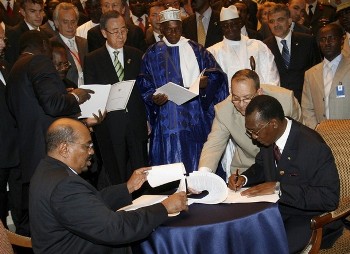Sudan, Chad talks on reconciliation continue in Qatar
April 30, 2009 (DOHA) – Delegations from Sudan and Chad held closed talks in the Arab Gulf state of Qatar to spell out the outstanding issues from the perspectives of each side.

He said that the talks aim at consolidating the pending items and presenting preliminary impressions on them as well as “building confidence” between the reconciling parties.
Relations between the two countries failed to survive three previous reconciliation agreements brokered by different countries. The latest one, Dakar peace agreement formed a group of contacts to monitor its implementation but however the two countries failed to observe it.
The Qatari official said that the focus should be on establishing an effective implementation mechanism to monitor what it is agreed upon.
The Sudanese minister for international cooperation Al-Tigani Fideil echoed the same and also said that today’s meeting was “useful”.
A portion of the talks is devoted to reviewing the positive and negative aspects of past agreements to arrive at a lasting solution, Sudanese Foreign Ministry undersecretary Mutrif Sideeg told Qatar’s state news agency (QANA) yesterday.
“We will work with our brethren in Chad to find lasting peaceful solutions for Chad’s issues, so that they do not have adverse reflections on Sudan” he said.
The African Union-United Nations joint mediator Dijibril Bassole hailed the Qatari-Libyan mediation effort between Sudan and Chad saying that they will be “instrumental” factor in achieving peace in Darfur.
“It is important to remove tensions between Sudan and Chad and this is what the Doha meetings seek and it is a peace process we support” Bassole said.
It is expected that the sticky issue between the two sides is deployment of joint monitoring units alongside the borders as agreed in the 2006 Libyan brokered agreement. Chad has declined implementation of this provision.
Since 2005 Sudan and Chad trade accusations of supporting respective rebel movements who want to topple their governments.
(ST)
